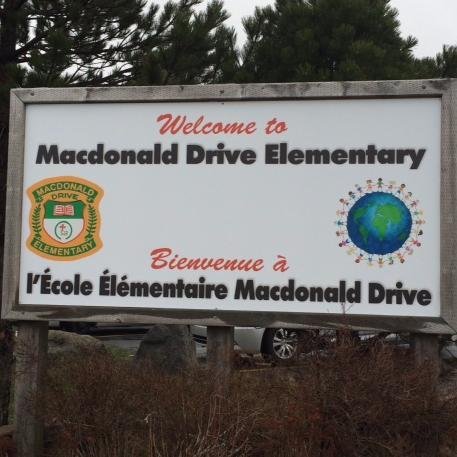Denominational Public School: A Personal Account
As a Canadian-American, I've had some unique cross-cultural experiences throughout my short life. While I'm fairly eager to share the perspectives I've gained, I am often too private to share the actual stories behind said views. Time to change that up.

In greater detail than the aforelinked post, my siblings and I were born in Newfoundland, Canada. This special island in the north Atlantic didn't enter into the capitalist economic system until well into the 60's, relied almost exclusively on a single industry to support its economy until the 90's, and was one of the first in the world to have a major catholic abuse scandal. But for my purposes, we'll focus on a strange condition wherein Newfoundland was exempt from Canadian education law and had a firm practice of denominational education.
As draft dodgers, my parents were anything but religious. Though brought up in staunchly religious households, they made serious efforts to raise the three of us as secularly as possible. I am grateful for this, but it meant that us kids were the black sheep of a highly religious culture, both catholic and protestant. Most importantly, it meant being educated in a Christian system while being both ignorant to and unpopularly critical of religion in the first place. This was unpleasant for my sister and I, but it was nothing short of traumatic for my brother.
Under the denominational system, there was little understanding of learning differences related to learning disabilities. The system seemed to value the faith more than the pedagogy and effective teaching practices, and there were literally no support services or facilitation policies in place for those who simply learn differently than others. My brother is dyslexic, dysgraphic, and has fine motor impairments, meaning that he struggles to learn communicative structures and his handwriting is barely legible. This combination of learning disabilities paired with a gross lack of understanding on behalf of the teachers and schools administrators led to grown adults calling him stupid, lazy, and telling him he would never graduate from high school. He struggled with depression from a very young age and believed himself to be intellectually inferior.
For my sister and I, our experiences were far less jarring. I have vivid memories of saying the Lord's Prayer every day at the start of school and before lunch. I remember taking religion classes and having actual "Christmas" and "Easter" breaks. I remember my parents trying to figure out how to afford to send us to private school, the only nondenominational option in the province and the only way for my brother to receive supportive learning resources.
Unfortunately, we were a lower middle-class family. But in 1993, circumstances changed. My maternal grandfather passed away unexpectedly, leaving my grandmother to live by herself for the first time in her 68+ years. My brother was in junior high and was starting to show signs of serious violence, setting things on fire and crafting homemade explosives, oftentimes talking about how he would love to use them at school. My parents saw what was going on and did what they had to do by sending my mother, brother, and I (my sister had finished high school) to live with my grandmother in Saint Paul, Minnesota. Grandma wouldn't be alone and we would have a place to stay while we went to school.
This was a watershed moment in my life. When I arrived in MPLS, I learned what culture shock really was. I was called stupid and inbred because of my accent. I was labeled Canadian because my Newfoundland identity meant nothing to those who couldn't find it on a map. It divided my family by almost 3000 miles, the repercussions of which continue to reverberate today.
When I began school in Minnesota, I took a series of tests to determine my placement and was told that I was to go into grade 2. I was 10 years old and had been one of the top performing students in my grade. I refused to accept sitting in classes with 7 year olds and so I spent my first year of schooling in Minnesota studying furiously to advance three grade levels. On the other hand, my brother excelled. He had tutors, note takers, and grading that could be adjusted based on his ability to learn. He quickly became one of the strongest students in his class and instead of making napalm in our kitchen, he practiced lines for the school play. It was a transformation and to this day, my brother is one of the most brilliant people I know, a true savant.
Two years after we started our international schooling, Newfoundland began debating its denominational school system. The Canadian Broadcasting Corporation of Newfoundland did an expose on my family to showcase the lengths some had gone in order to give their children access to a more modern education. On September 2, 1997, three years after we enrolled in Saint Paul School Schools, Newfoundland held a referendum to create a nondenominational school system. Today the province offers a modern secular education. Students learn independent of religious influence and no longer say prayers at the start of class.
The referendum was too late for my family, which is and will probably always be divided by distance, culture, and experience. But we were a part of why the change happened, however small, and for that I am proud. The antiquated Newfoundland school system informed the rest of my life, and I'm glad that my life and that of my family members informed the education of countless Newfoundlanders.